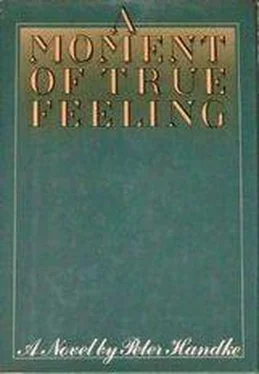As a participant in a press conference devoted to the program of the new government, Keuschnig had nothing to worry about for the present. In such a place the omens of death seemed unthinkable. He no longer had to picture his own future, there was no further need to fear surprises; just to sit here — and better still, to sit here ecstatically taking notes along with so many others — was today his idea of peace. Up front, far in the distance, the President of the Republic was explaining the program, and as he spoke Keuschnig was conscious of an animal certainty that everything would get better and better. When a journalist asked if a certain project wasn’t absurd, the President replied: “I cannot afford to look on what I am doing as absurd.” That answer struck Keuschnig’s fancy and he wrote it down. Here nothing was said that was not meant to be taken down; that in itself was comforting! Keuschnig no longer understood why he had been so relieved some months before when after the elections the good old advertisements had replaced campaign posters on the city’s walls. Had the campaign posters represented a threat that something would HAPPEN? Why at the time had he felt the elections to be meaningless and unreal? Now he felt strangely secure in the thought that a policy was being formulated for him. It was so comforting to be able to think about oneself in terms formulated by others; the program he, along with the others, was taking down told him what kind of person he was and what he needed; it even prescribed a specific order of succession! And that part of him which was not defined in the program could be ignored — since it was only a holdover from rebellious adolescence and he himself was to blame if he hadn’t got it under control. I’ve been defined! he thought — and that flattered him. Being defined had the advantage of making him inconspicuous, even to himself. How could he have let a stupid dream upset him so? Who was he that he should presume to see meaning in life only on high holidays? He had indulged his strictly private caprices long enough! He set too much store by mental games that other people simply couldn’t afford. — And what if he found himself in danger again as today? Then, if only he could learn to see everything in its proper place like an adult, he would have a foolproof system by which to redefine himself at any time. — If I can manage that, Keuschnig thought contentedly, no one will ever find out who I really am! — The President’s THOUGHT-MOLDED face … Through the most tortuous sentence he found his way to a sure conclusion. To the most surprising question he had an immediate answer, and once it was uttered he shut his mouth as though EVERYTHING had now been said. Keuschnig felt he was in good hands. He heard the succession of questions and answers, the hum of the TV cameras, the baying of the Nikons, as utility music devised especially for him. But then a flashbulb exploded. A bird outside bumped into one of the high narrow windows, fluttered away, and collided with another window. A panic broke out in Keuschnig when he thought of the lengths he had again gone to in feigning to feel secure. There was no more room for diversions. This was really a life-and-death matter. — The wind had died down, but when in the stillness a flock of pigeons flew up from the court, it sounded to him like the first squall signaling a hurricane. The President, who had been made up for television and wasn’t missing a trick, thrust out his lips; he had planned every move in advance; that was his charm. Now Keuschnig knew what was troubling him: that the government’s program existed for everyone and not for him alone. He took refuge, as he had done when attending lectures at the university, in looking out the window: the white, looped-back curtains — but that swishing sound — where did it come from? Ah, he thought with pleasure, it’s raining. It had begun with a crackling, as when a heavily loaded hay wagon is set in motion. Then, high above the Elysée Palace, thunder rolled, and a sudden sense of security made his skin tingle.
The President took off his glasses and said: “I am a lover of change.” This remark was followed by a pause, and Keuschnig was afraid the journalists wouldn’t have any more questions. He leafed quickly through his notebook — the sound was like that of the pigeons a moment before. Nothing relevant occurred to him. Mr. President, would you like to see blood? The television lights went out, and no sooner had he taken advantage of his last opportunity to do what other people were doing and put his hand over his eyes, than the President of the Republic vanished. (The how-manyeth Republic? Keuschnig thought. Once again, counting proved helpful. It seemed to him that he too was being counted, which at least gave him the satisfaction of feeling himself to be a contemporary.)
He didn’t want to go home yet. He felt that if he got there too soon Stefanie wouldn’t be ready for him. (And today he too would have to rehearse, to rehearse the act of seeing her and the child again.) Maybe he would surprise her in some secret if he opened the door ahead of time. So he bought a paper at the stand on the Avenue Marigny — from my friend, he thought — and holding it over his head to shield himself from the rain, walked as slowly as he could without its getting on his nerves, this way and that way, through the streets of the 8th arrondissement.
In a bakery with little left to sell, a bakery girl was sitting alone, gazing round-eyed into space. He bought an oval loaf of bread, and she waited on him patiently. She gave him his change and started cleaning her nails as he was leaving. The sight gave him a feeling of lightness. He passed a lottery stand that looked as if it had been closed a long time; all he could see inside was a knitted vest on a hanger. In a laundry, pale-faced women were sitting with their hands in their laps, laughing now and then. In a restaurant the tables were set but still unoccupied, except for one in the far corner, where the boss and his helpers were sitting with elbows firmly propped, pouring themselves red wine out of bottles without labels. — A bus came along — jiggling straps, steam from the passengers’ wet clothing — passed and continued on, as though taking some part of him away with it. I’m going to think up something! Keuschnig thought. A sign by the door of the bus had said: SERVICE NORMAL.
He followed a woman who was pushing a shopping cart down the rue Miromesnil, curious to see what would happen if he just kept following her. Here it was so quiet he suddenly noticed how deeply he was breathing. He heaved a sigh. The few sounds to be heard — the occasional scrape of the woman’s high-heeled shoes, the buzz of a door buzzer farther away, the click of the almost simultaneously opening door, an apple rolling to the street from its pyramid in a COURS DES HALLES shop — seemed to give assurance of his own quietness. He still hadn’t seen the woman’s face, and that aroused him. He waited for her in front of a butcher shop; she had left her cart on the sidewalk, a bunch of parsley was sticking out. But then his gaze lost itself in the agglutinations of sawdust that had formed on the tile floor in the course of a long day, and when at last he looked up, the woman was turning into another street, where there was noise again. He followed her to the Champs-Elysées and into the PRISUNIC. It calmed him to go up and down stairs to the accompaniment of music and amplified announcements of PRISUNIC specials; his independent existence slipped away in the process. — At the pet-food section the woman turned around while some cans of cat food she had bought were being put into a brown paper bag. By that time his curiosity about her was nearly gone. She made a face, as if to say that she had expected no more of him. It wasn’t him she saw but SOMEONE LIKE HIM. Only a moment ago, Keuschnig reflected, I was genuinely unhappy at the thought that in another minute this woman would vanish forever from my life. And now the pleasant feeling that I haven’t missed anything. — Relieved, he had his picture taken at the Photomaton. The flashes of the color machine were so intense that the warmth touched his face like a soothing caress. — Then the PRISUNIC closed, and he had to go out into the street again.
Читать дальше












